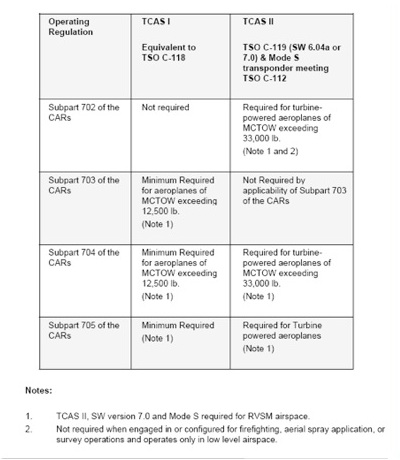
News
Mandatory ACAS/TCAS – are you ready?
May 4, 2009 – Airborne Collision Avoidance Systems (ACAS) and Terrain Collision Avoidance Systems (TCAS) are by no means new to our discussions.
May 4, 2009 By Administrator
May 4, 2009 – Airborne
Collision Avoidance Systems (ACAS) and Terrain Collision Avoidance
Systems (TCAS) are by no means new to our discussions. The systems have
been in wide use and acceptance for many years. In point of fact,
Canada is well behind the rest of the world in the mandated use of such
equipment. On July 1st of this year the use of ACAS/TCAS will become a
mandatory item on commercial aircraft that previously did not require
such.
This change has been under active discussion since at least 2000. The
CAR’s were amended to include an ACAS rule in July of 2007 giving
operators up to 2 years to comply on older aircraft. That compliance
date expires this July 1st. For those operators hoping for a reprieve
or last minute exemption, the simple fact is that July 1st is now the
date and after that, you will be required to have the appropriate
ACAS/TCAS modifications installed, approved and functional on your
aircraft.
Transport Canada (TC) Advisory Circular RDMIS No: 2487968, issued
September 1, 2007 updated the previously issued Commercial and Business
Aviation Advisory Circular 0236 Issue 1, dated 2005-07-29— Regulations
for Terrain Awareness Warning System and Airborne Collision Avoidance
System. In this document it states that the TC regulations for ACAS
have been developed in recognition of the safety benefits of the
equipment, and with the goal of having standards and/or regulations in
place that are similar to ICAO and the FAA. Furthermore it states that
the TC regulations have been developed as an outcome of a
Transportation Safety Board (TSB) recommendation for TC to analyze the
benefits of ACAS for commercial passenger carrying aircraft.
Under the new regulations published by TC, ACAS equipment is mandatory
and required for aircraft operating under Subparts 702, 703, 704 and
705 of the CARs. Accordingly, TCAS I is the minimum acceptable
collision avoidance system for large aircraft (Maximum Certificated
Take-off Weight (MCTOW) greater than 12,500 lb/5,700kg) operating under
Subpart 703 of the CARs – Air Taxi Operations, Subpart 704 of the CARs
– Commuter Operations and Subpart 705, non-turbine – Airline Operations.
TCAS II (SW version 6.04a) and a mode S transponder, is the minimum
acceptable collision avoidance system for turbine-powered aircraft
operating under Subpart 705 of the CARs, Airline operations, and for
turbine-powered aircraft with a MCTOW exceeding 33,000 lb/15,000 kg
operating under and Subpart 704 of the CARs. For turbine-powered
aircraft with a MCTOW exceeding 33,000 lb/15,000 kg operating under
Subpart 702 of the CARs (turbine powered land aircraft only) may
operate without an operative ACAS only if it engaged in or configured
for firefighting, aerial spray application, or survey operations and
while operating only in low level airspace.
TCAS II (ACAS II SW version 7.0) and a mode S transponder is the
minimum acceptable collision avoidance system for all aircraft,
operating under Subparts 702, 703, 704 and 705 of the CARs requiring
ACAS equipment, when operations are conducted in Reduced Vertical
Separation Minima (RVSM) airspace.
The following is taken from the TC Advisory Circular and gives a quick summary of ACAS requirements:
 |
Those operators who will be affected by this should contact us sooner
than later in order to get plans and discussions underway as soon as
possible. Contact either Barry Aylward or Bill Arsenault. You can reach
them by email at barry@kitcheneraero.com and bill@midcanadamod.com or
by telephone at the numbers published below.
Kitchener Aero: (519) 648-2921 or 1-800-928-4669
International Airport, Hanger 9 Box 69 Bresiau, Ont. N0B 1M0
www.kitcheneraero.com
Mid Canada: (905) 673-9918
Mail address: P.O. Box 160, Toronto, Ont. L5P 1B1
www.midcanadamod.com